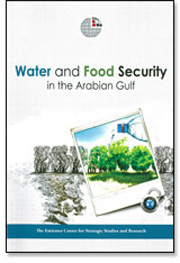
- Online publication date:
- September 2014
- Print publication year:
- 2013
- Online ISBN:
- 9789948146247
- Subjects:
- Life Sciences, Ecology and Conservation


Growing populations and economies have led to an increase in water demand around the globe. However, there are large variations in the amounts of water available to nations and regions, and growing concern surrounding the uncertainty associated with these supplies, due in large part to natural and human impacts on the water cycle. Despite its high financial and resource costs, many see desalination as the only viable means of ensuring water supply in the region. They argue that increasing reliance on desalination technology will be the most effective way of augmenting current supplies, despite the security risks associated with this option. While desalination plants are susceptible to natural hazards, mechanical failures and sabotage, they provide the Gulf states with an 'upstream-like' status in terms of their water resources, with all the security and stability this provides. Hence the geopolitical and security benefits of desalination are greater than the potential costs. Like water security, global food security also faces an uncertain future. The Arabian Gulf region suffers from a substantial food gap, as all the countries of the region are net food importers. The increase in the region's population, rising income levels, and harsh weather conditions that prevent the increase of local food production, have resulted in a vast increase in the region's food imports, from a total value of US$ 6.5 billion in 1990 to US$ 28 billion in 2008. Over the past few decades, there have been major changes in the Gulf populations' food consumption patterns and behavior. This dependency is expected to continue to rise as a result of rapidly growing populations, improving living conditions, sustained economic/industrial development and depleting natural resources. To meet their food needs the Gulf countries must rely on international markets, which makes them vulnerable to the vagaries of global food production, trade policies and commodity prices. This is exemplified by the food crisis of 2007/2008, which led Arab Gulf countries to adopt strategies that include building up national strategic food reserves, scaling up subsidies, and acquiring land abroad for agricultural investments. International agro-investments have been a widely publicized reaction of the UAE and other Gulf countries to the global food crisis of 2008, but to improve food security other policy fields may be more important, and the UAE has a considerable number of national levers at its disposal to influence them in its favor. International storage solutions and other forms of multilateral engagement could make global food markets more reliable and predictable.
 Loading metrics...
Loading metrics...
* Views captured on Cambridge Core between #date#. This data will be updated every 24 hours.
Usage data cannot currently be displayed.